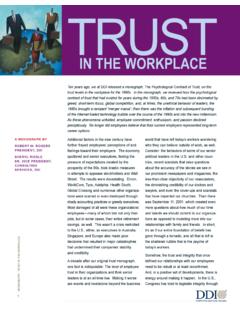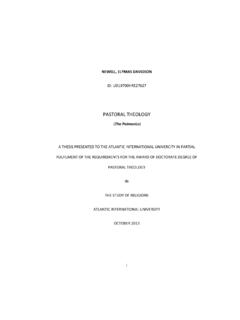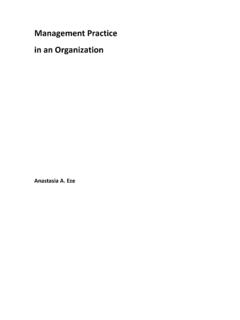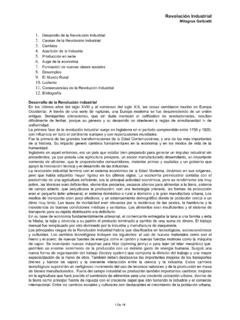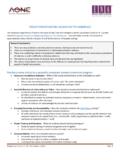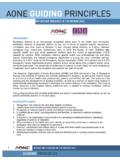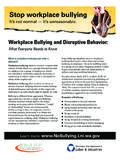Transcription of Trust in the Workplace - Atlantic International University
1 Additional factors in the new century have further frayed employees perceptions of andfeelings toward their employers. The economysputtered and senior executives, feeling thepressure of expectations created by the prosperity of the 90s, took drastic measures in attempts to appease stockholders and WallStreet. The results were devastating. Enron,WorldCom, Tyco, Adelphia, Health South,Global Crossing and numerous other organiza-tions were scarred or even destroyed throughshady accounting practices or greedy damaged of all were these organizations employees many of whom lost not only theirjobs, but in some cases, their entire retirementsavings, as well.
2 This wasn t a crisis restrictedto the , either, as executives in Australia,Singapore, and Europe also made poor decisions that resulted in major catastrophesthat undermined their companies stability and credibility. A decade after our original Trust monograph,one fact is indisputable: The level of employeetrust in their organizations and their seniorleaders is at an all-time low. Making it worseare events and revelations beyond the businessworld that have left today s workers wonderingwho they can believe outside of work, as : the behaviors of some of our seniorpolitical leaders in the and other coun-tries, recent scandals that raise questionsabout the accuracy of the stories we see in our prominent newspapers and magazines, theless-than-clear objectivity of our newscasters,the diminishing credibility of our doctors andlawyers, and even the cover-ups and scandalsthat have imperiled our churches.
3 Then therewas September 11, 2001, which created evenmore questions about how much of our timeand talents we should commit to our organiza-tions as opposed to investing more into ourrelationships with family and friends. In short,it s as if our entire foundation of beliefs hasgone through a tornado, and all that is left isthe shattered rubble that is the psyche oftoday s , the Trust and integrity that oncedefined our relationships with our employeesneed to be rebuilt or at least reconfirmed. And, in a positive set of developments, there isenergy around making it happen. In the ,Congress has tried to legislate integrity throughTen years ago, we at DDI released a monograph, The Psychological Contract of Trust , on thetrust levels in the Workplace for the 1990s.
4 In the monograph, we reviewed how the psychologicalcontract of Trust that had existed for years during the 1950s, 60s, and 70s had been decimated bygreed, short-term focus, global competition, and, at times, the unethical behavior of leaders; the1980s brought a rampant merger mania ; then there was the inflation and subsequent bursting of the Internet-fueled technology bubble over the course of the 1990s and into the new these phenomena unfolded, employee commitment, enthusiasm, and passion declined precipitously. No longer did employees believe that their current employers represented long-termcareer : Trust IN THE WORKPLACE1 TRUSTIN THE WORKPLACEA MONOGRAPH BYROBERT W.
5 ROGERSPRESIDENT, DDISHERYL RIDDLESR. VICE PRESIDENT,CONSULTINGSERVICES, DDIthe Sarbanes-Oxley act. Articles, speeches, andstories on Trust and ethical behavior, which havebecome hot topics, are everywhere. WithinDDI, we ve recently realized that we needed toadd integrity to our set of core values that we useto describe our cultural strategy. In the past, wealways believed we didn t need to list integrity asa value, that integrity and its byproduct, Trust ,were simply characteristic of the way leaderswere supposed to behave. We couldn t legislateit, we couldn t write policies demanding it it simply was the right thing to do.
6 In the last century, Albert Camus wrote (and webelieved), Integrity has no need for rules. Fourhundred years ago, Shakespeare lamented, To thine own self be true. But in 2003, the factsare in, and apparently there aren t enough seniorleaders who understand the major risks andcosts of not demonstrating integrity in all thatthey do. The consequences are the cynical attitudes of today s employees attitudes thatcan only distract from an organization s IS INTEGRITY, AND WHAT IS ITS RELATIONSHIP TO Trust ?Integrity means adhering to a code of ethics or a set of values, and it is a vital aspect of everypersonal and professional endeavor.
7 It meansmatching our actions with our beliefs across avariety of situations. Integrity, as a measure ofcoherence and consistency, is key to buildingand sustaining Trust . We Trust those who arehonest and consistent in their actions, who fullydisclose important information, who are willing todeal with tough issues, and who are open abouttheir objectives and that prosper over the long runcommit to fundamental integrity in their productsand services, their processes and systems, andtheir people. They walk the talk, even in thetoughest of times. They base their interactionswith clients on all principles of honesty, integrity,and partnership.
8 They hold their leaders andemployees accountable for modeling the highestethical business practices in every aspect of theirwork. They keep their promises and followthrough on commitments. ARE INTEGRITY AND Trust ISSUESFOR YOUR ORGANIZATION?What leaders fail to realize is the power behindbeing perceived as having high integrity andbeing trustworthy. These perceptions truly doimpact business results. Yet, often our behavioras leaders drives just the opposite. Trusted leaders get many rewards: engaged employees,retention of top talent, positive work culture,and most important results.
9 Why is it that sofew realize the power of integrity and Trust asbusiness tools? As a leader, where do you stand? Here aresome of the warning signs that Trust is an issuein your organization or for you, personally:>An active, inaccurate grapevine.>Elaborate approval processes.>Low initiative.>High turnover.>A high fear factor among employees.>Turf wars.> are signs a Trust issue exists, but the goodnews is that it is an issue that can be addressed. BUILDING HIGH LEVELS OF INTEGRITYAND Trust WITHIN AN ORGANIZATIONS imply put, Trust means confidence confidencethat others actions are consistent with theirwords, that the people with whom you work are concerned about your welfare and interestsapart from what you can do for them, that theskills you have developed are respected and valued by your coworkers and the larger organization, and that who you are and what you believe truly matter in the : Trust IN THE WORKPLACE2 More than 35 years ago in The Professional Manager,Douglas McGregor described the importance of Trust .
10 Trust means I know that you will not deliberatelyor accidentally, consciously or unconsciously takeunfair advantage of me. It means I can put my situation at the moment, my status and self-esteem inthe group, our relationship, my job, my career, evenmy life in your hands with complete confidence (1967, p. 163). Trust in organizational strategies and top manage-ment is the most critical component in creating commitment toward a common goal. Achieving thattrust, however, can be difficult. Leadership guru,management consultant, and successful author Tom Peters captures the predicament this way: Maybe the boss can force a person to show up for work, especially in trying times, but one cannot,by definition, force a person to contribute his or her passion and imagination on a regular basis (1993, p.)
